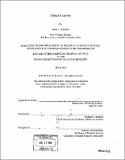Political creativity
Author(s)
Kubicek, Brett V. (Brett Vincent), 1972-
DownloadFull printable version (14.91Mb)
Other Contributors
Massachusetts Institute of Technology. Dept. of Political Science.
Advisor
Richard J. Samuels.
Terms of use
Metadata
Show full item recordAbstract
This thesis is about political change and the possibilities for politically creative individuals to achieve desired change. To identify such possibilities, I argue that we should employ a catalog of analytical tools from the social, psychological and cognitive sciences, organized in three sets. One covers social dynamics, the social mechanisms behind stability and change, either sudden or incremental; the second captures ordinary differences among group members in how they understand conditions, react to events, and connect to others; and the third set deals with extraordinary differences in mindsets and aptitudes which may enable individuals to exert considerable influence on conditions. A fundamental problem is the difficulty of separating the impact of individual action (agency) from effects of social conditions and trends (structure), given that political events involve interaction of the two. My solution is to focus onprojects for political change, which are long-term endeavors that go against prevailing conditions and conventional ideas, and which focus upon changing one broad element of the political landscape (such as to restructure inter-group relations, to empower a previously weak constituency, to change certain status quo ideas and practices, or to reshape particular institutions of government). Such long-term work by specific actors facilitates analysis of whether they (and people in similar positions) face extraordinary problems, and whether extraordinary differences are necessary to bring creative political change. The first half of this thesis builds the three toolsets and an approach for applying them to considerations of political creativity. The second half supports this theory building by demonstrating that the tools and (cont.) approach are useful and feasible, through applications to several studies of efforts at political change, which achieved varying levels of success. Overall, the idea is to coordinate findings about the dynamics of social conditions and about individual characteristics, to better understand possibilities for political creativity.
Description
Thesis (Ph. D.)--Massachusetts Institute of Technology, Dept. of Political Science, 2004. Includes bibliographical references (p. 279-297).
Date issued
2004Department
Massachusetts Institute of Technology. Department of Political SciencePublisher
Massachusetts Institute of Technology
Keywords
Political Science.